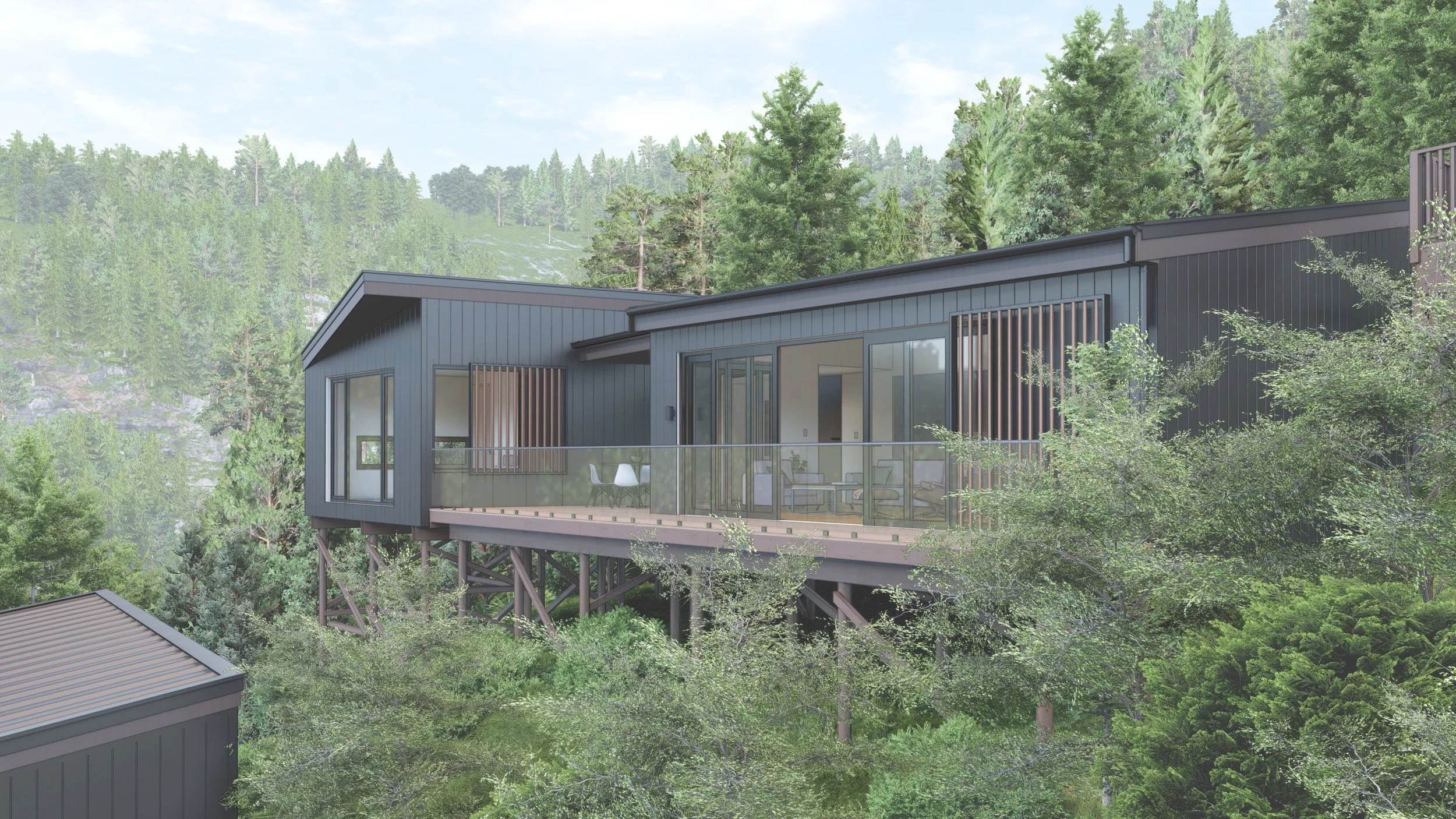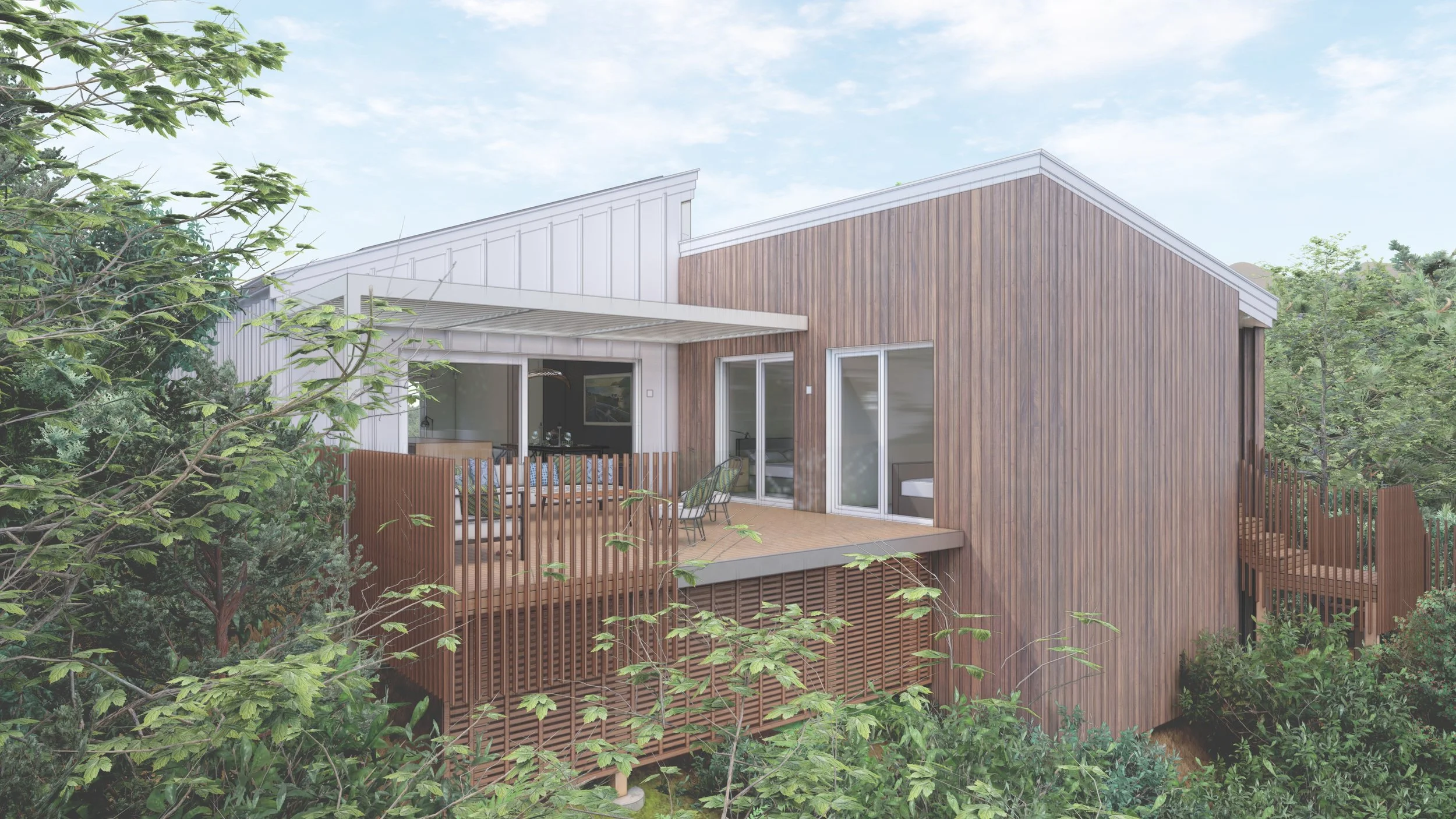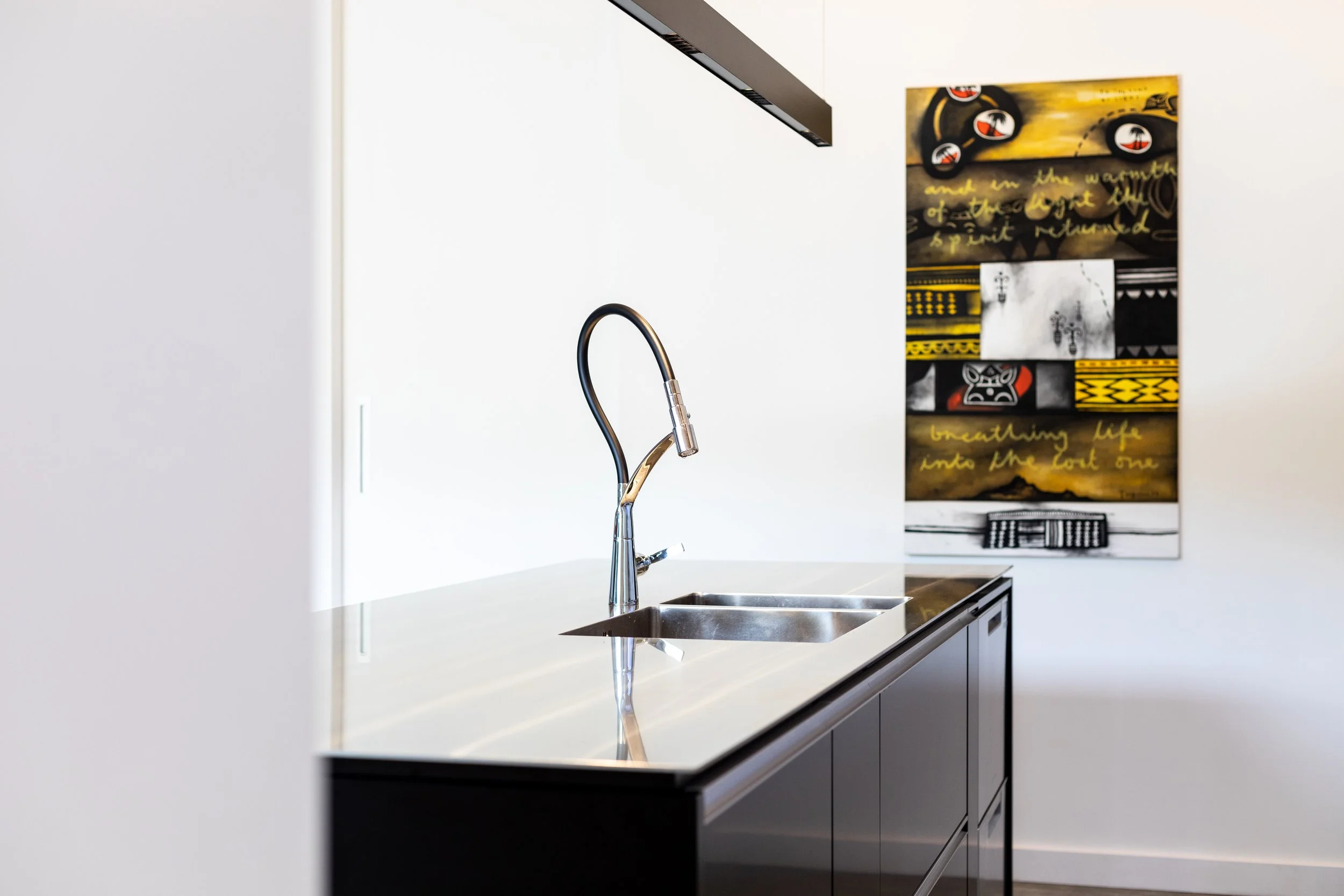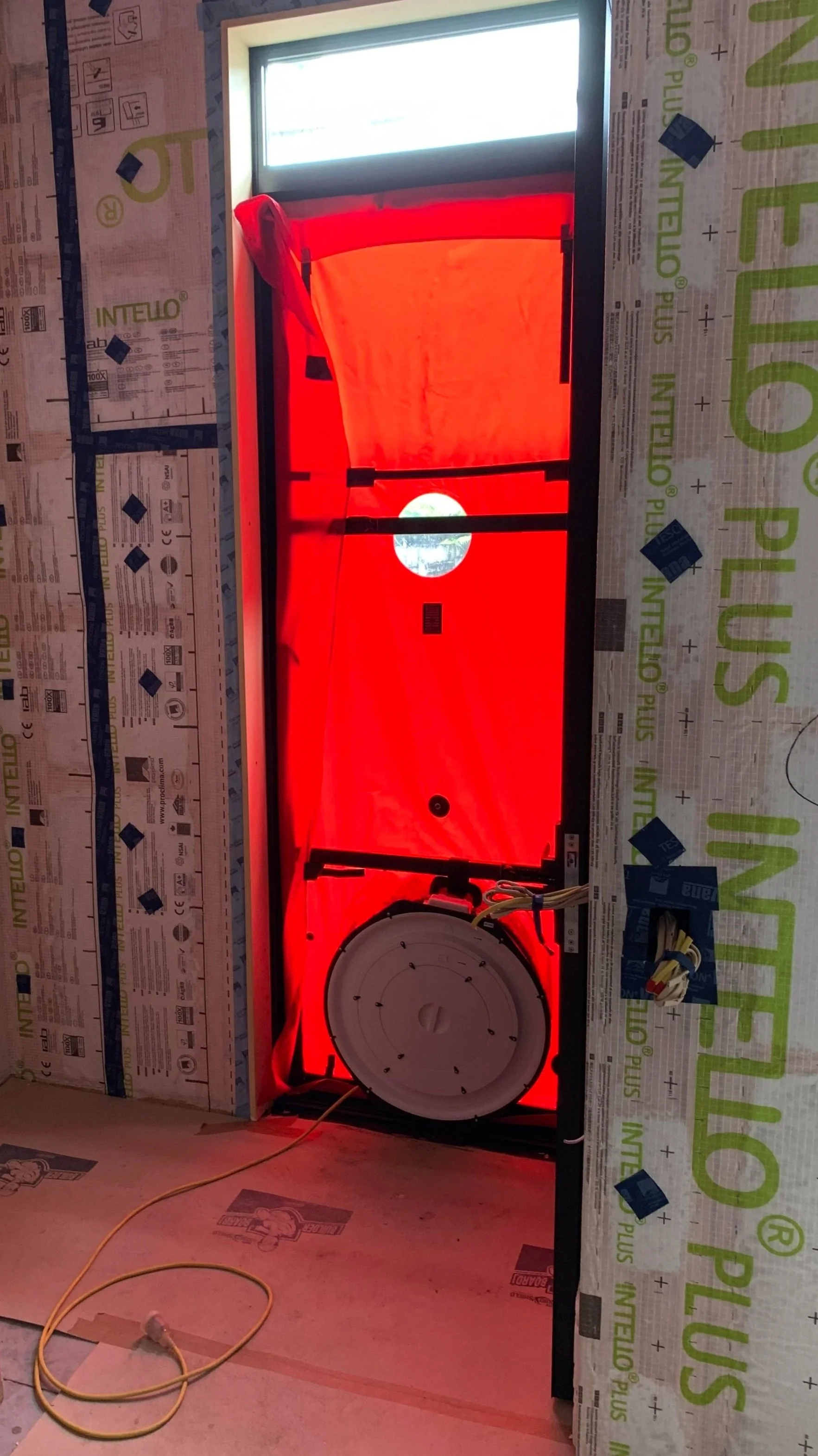Homestar
New Zealand's leading holistic sustainability certification
A rating system for designing and constructing homes that are healthier, more efficient, more comfortable and more sustainable than the inadequate New Zealand Building code.
Mornington Passive House, Wellington.
Targeting Homestar 8
The way we live in our homes has changed and evolved over the years, as has our knowledge and understanding about the need for better, healthy, energy efficient, comfortable homes. The Building Code hasn't done much to keep up, meaning a new house built to code can still be damp and mouldy in winter and overheat in summer.
Unlike the Building Code, Homestar has evolved to better reflect our changing living habits and the unique demands of the New Zealand climate. Building to Homestar helps to overcome issues such as damp, mould and overheating by identifying these risks early on. Sufficient and well-placed insulation, ventilation, and shading can then be incorporated cost effectively. Not only will your home be more comfortable and healthier, but by building to Homestar, your home will function more efficiently and could be better for your back pocket too.
The Holistic approach of a Homestar Home
Homestar is a holistic tool that awards points across various credits to rate a home’s performance and environmental impact. There are mandatory minimum requirements focused on keeping the home, warm, dry, well-ventilated, and operating efficiently. Otherwise, the tool is flexible. The credits are open to various combinations to reach the points required to achieve the desired rating.
The main requirements of a Homestar certified home are:
Continuous mechanical ventilation:
Providing healthy, clean filtered air to the home at all times.
Continuous Insulation:
Mitigating potential thermal bridges (cold spots where heat is lost through conductive material or air transfer) continuous insulation wraps the entire building envelope.
Carbon:
Accounting for both embodied and operational carbon, Homestar homes strive to reduce carbon emissions throughtout their lifecycle.
Cool:
Intelligent design (think shading, glazing coatings, building orientation etc.) reduces the risk of overheating. Thermal modelling can be used further your confidence in your homes projected performance and potential necessity to adapt to climate change.
Water use:
Homestar homes achieve water efficiency through features like low-flow fixtures, rainwater harvesting, and drought-resistant landscaping, reducing consumption, utility bills, making them more sustainable.
Higher ratings can be achieved when sustainable practices, energy generation, social engagement and innovative initiatives are implemented.
Key Projects
Church Bay (targeting Homestar 7)
Mornington (targeting Homestar 8)
Frequently Asked Questions
Q: What is a Homestar rating and what does the scale mean?
It's an independent NZGBC rating (scale of 6-10) that assesses a home's health, warmth, and environmental performance, requiring standards higher than the Building Code. A 6 is the minimum certified standard, and a 10 is a world-leading eco-home.
Q: Why is a Homestar rating needed if a new home is built to the Building Code?
The Building Code sets minimum standards, which often still results in uncomfortable, damp, or poorly ventilated homes. Homestar has mandatory requirements (like continuous insulation and mechanical ventilation) to ensure a home is warm, dry, and healthy.
Q: How much does it cost to get a Homestar rating?
A study by consultants Aurecon, with costings by quantity surveyors Kwanto, found the cost of meeting a 6 Homestar v5 rating compared to the latest Building Code energy efficiency requirements was between 0-1.3% depending on where you are in the country.
The report found the cost, excluding fees, of building to Homestar 6 varied from no additional cost for a 2 bedroom terrace in Christchurch and Wellington, to a maximum of 1.3% extra for a 4 bedroom standalone home in Christchurch.
Q: When should I begin incorporating Homestar into my project?
Start at the beginning of the design stage with a Homestar Designer and Assessor. Leaving it until construction is underway or completed makes it very difficult and costly to achieve certification, as evidence is required throughout the process.
Q: Can I get a Homestar rating for an existing home?
Yes, Homestar is applicable to both new homes and existing homes undergoing major renovations. While it was developed with new homes in mind and generally requires consideration at the design stage, it can be used to assess and certify existing homes that have undergone significant upgrades
Q: What are the key benefits of a Homestar home?
The main benefits are improved health and comfort (warmer, drier, better air quality), significantly lower running costs (due to energy and water efficiency), and increased property value, often with access to financial incentives like lower mortgage rates from banks.
Consulting + Services
Whether or not we were involved in the initial design of your project, we offer comprehensive review services to assess its current performance. Our team can identify areas for improvement and provide expert advice on adjustments or optimizations needed to achieve the desired energy efficiency, sustainability, or comfort goals. From recommending design changes to suggesting more efficient materials or systems, we work with you to ensure your project meets the highest standards and performs as intended.
-
Our thermal modelling consulting uses simulation tools to optimize a building's thermal performance, considering factors like insulation, windows, ventilation, and climate.
Services include:
Energy Efficiency Analysis: Identifying areas for improvement in insulation, heating, cooling, and ventilation.
Optimization: Recommending adjustments to enhance comfort, reduce energy use, and save costs.
Performance Review: Offering guidance for further certification, if desired.
-
Our Passivhaus consulting services ensure your building meets the energy-efficient standards for Passivhaus (Passive House) certification.
Our services include:
Energy Modelling and Analysis: Predicting energy use to meet Passivhaus standards for performance, insulation, airtightness, and ventilation.
Design Guidance: Helping your architect/designer optimize thermal insulation, windows, and airtight construction.
Performance Verification: Verifying compliance with energy standards through testing and evaluation.
Certification Support: Guiding your project through the Passivhaus certification process.
As certified Passivhaus Designer/Consultants, we ensure your building is energy-efficient, comfortable, and sustainable.
-
Thermal bridge calculations analyse heat loss or gain at areas where insulation is interrupted, such as junctions, windows, and structural elements. These "thermal bridges" allow more heat flow, affecting energy efficiency and comfort.
The calculations help to:
Identify Heat Loss: Pinpoint areas of significant heat transfer.
Assess Performance: Evaluate the impact on energy use and indoor temperature.
Ensure Compliance: Meet energy codes by reducing heat loss.
Improve Design: Recommend changes to eliminate thermal bridges.
These calculations optimize thermal efficiency, reduce energy costs, and improve comfort.
-
Our Homestar assessments evaluate the sustainability of residential buildings in New Zealand, focusing on energy efficiency, water usage, air quality, and environmental impact.
The process includes:
Scoring: Evaluating insulation, heating, ventilation, and materials.
Energy Efficiency: Ensuring low energy use and carbon footprint.
Comfort and Health: Assessing indoor air quality and thermal comfort.
Sustainability: Reducing environmental impact through water and waste management.
Certification Support: Guiding your project through the Homestar certification process.
The final 6-10 Homestar rating recognised improved sustainability, increased property value, and lower energy and maintenance costs. Some banks also offer interest rate discounts for homes achieving a Homestar 6 rating or better.
Queens Drive, Lyall Bay. Wellington.

“Jason is very easy to work with and knows what he’s talking about when it comes to thermal modelling. He’s friendly, knowledgeable and approachable, so highly recommended.”
“Jason Macquet has Exceptional Knowledge provided Great Service and is using really up to date software and information to produce his reports. I would highly recommend him.”
“What a great experience with Jason planning and executing our new home build. He listened to what we wanted and was on the same page as us right from the beginnning but also added some awesome architectural features that made our plans even better then we could have imagined. ”





